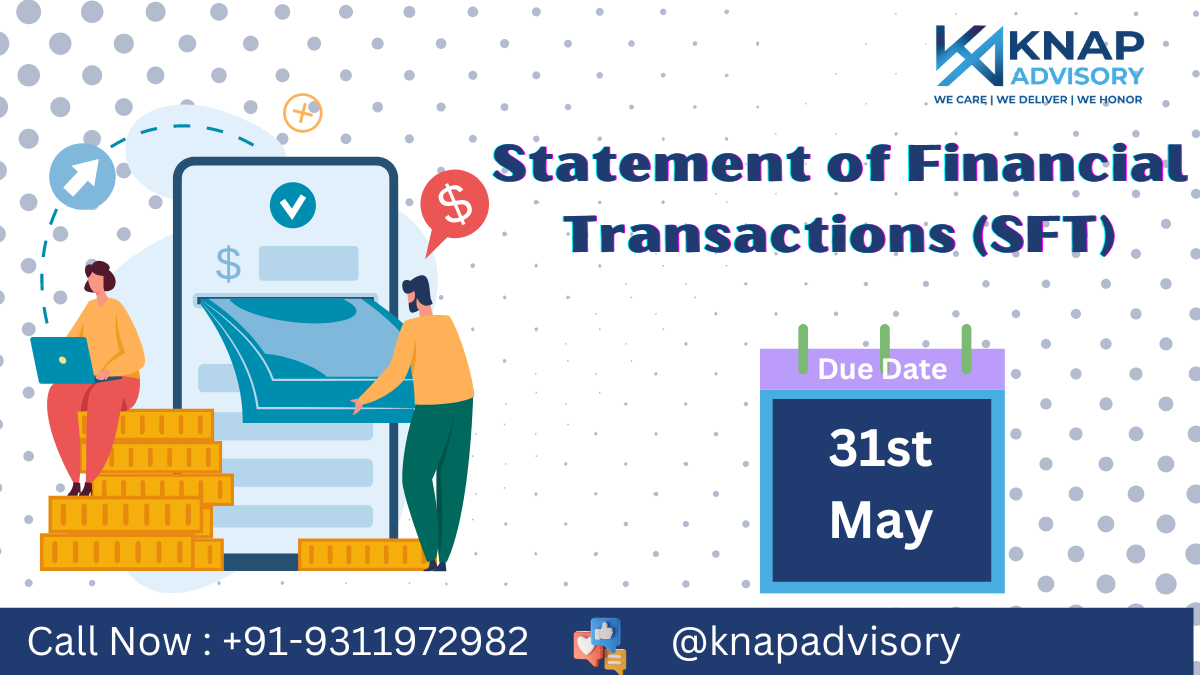


Statement of Financial Transactions (SFT) is a crucial component of financial reporting mechanisms, designed to provide comprehensive insights into various financial activities within an economy. Its primary purpose is to facilitate transparency and accountability in financial transactions while enabling regulatory bodies and tax authorities to monitor and analyze economic activities effectively.
SFT operates within a well-defined legal framework established by relevant laws and regulations. These include statutes such as the Income Tax Act, 1961, and the Financial Intelligence Unit-India (FIU-IND) guidelines. Compliance with these regulatory requirements is mandatory for entities falling within the ambit of SFT reporting obligations.
SFT encompasses a wide array of financial transactions, including both cash and non-cash transactions. Cash transactions refer to those involving physical currency, while non-cash transactions involve electronic transfers, securities, and other financial instruments. Additionally, SFT also covers high-value transactions, which are subject to heightened scrutiny due to their potential implications for financial stability and integrity.
Various entities are obligated to furnish SFT reports, including banks, financial institutions, businesses, corporations, and individuals engaged in specified financial activities. These entities are required to diligently comply with reporting obligations and ensure the accuracy and completeness of the information provided.
SFT reporting thresholds are predetermined limits beyond which transactions must be reported to the appropriate authorities. However, certain transactions may be exempted from reporting requirements based on specific criteria established by regulatory authorities.
SFT reports typically include detailed information regarding the parties involved in the transaction, the nature and value of the transaction, and the mode of transaction employed. This information is crucial for regulatory analysis and monitoring purposes.
These transactions, along with those previously mentioned, are subject to reporting requirements under SFT. However, specific exemptions may apply based on criteria established by regulatory authorities.
Reporting entities are required to submit SFT reports through designated electronic reporting systems established by regulatory authorities. These systems facilitate seamless transmission of data and ensure compliance with prescribed reporting formats and submission deadlines.
Non-compliance with SFT reporting obligations may result in severe penalties, including monetary fines and legal consequences. Entities failing to meet their reporting obligations risk facing punitive measures imposed by regulatory authorities.
SFT plays a significant role in combating financial crimes such as money laundering and tax evasion. By providing comprehensive insights into financial transactions, SFT enables authorities to detect suspicious activities and take necessary enforcement actions.
SFT data serves as a valuable resource for tax authorities and regulatory bodies in analyzing economic trends, identifying potential tax evasion schemes, and formulating effective policy measures to promote financial integrity and stability.
While SFT reporting is essential for regulatory purposes, concerns regarding data security and privacy must be adequately addressed. Regulatory authorities must implement robust measures to safeguard sensitive information and ensure compliance with data protection laws.
Efforts are underway to harmonize SFT reporting standards internationally and align them with best practices adopted in other jurisdictions. Comparative analysis of SFT systems worldwide facilitates cross-border cooperation and enhances the effectiveness of regulatory efforts.
Despite its significance, SFT implementation faces various challenges, including technological constraints and interpretation issues. Addressing these challenges requires collaborative efforts from stakeholders and ongoing regulatory reforms.
The future of SFT reporting is characterized by the adoption of advanced technologies and enhanced collaboration between stakeholders. Continued innovation and regulatory reforms are expected to further strengthen the effectiveness of SFT mechanisms in promoting financial transparency and integrity.
For businesses navigating the complexities of SFT filing and other compliance services, the expertise of KNAP Advisory offers invaluable support. With their specialized knowledge and experience, KNAP Advisory's team of experts provides tailored solutions to ensure seamless compliance with regulatory requirements. From assisting in data collection and reporting to offering strategic guidance on risk management and regulatory best practices, KNAP Advisory stands ready to support businesses in meeting their compliance obligations effectively and efficiently. With KNAP Advisory by your side, you can navigate the intricacies of regulatory compliance with confidence, knowing that you have a trusted partner dedicated to your success.

26 Nov, 2025

10 Sep, 2025


31 Aug, 2024

31 Aug, 2024

05 Apr, 2024

03 Jan, 2024

13 Dec, 2023

11 Dec, 2023

08 Dec, 2023

06 Dec, 2023

24 Feb, 2023
We have been especially crucial in ensuring startups are compliant with India's complex legal structure. We accept responsibility and obligation on behalf of the business owners and co-founders for adhering to all legal requirements. We strive to deliver a wide range of quick, effective, and compliance-focused services to any company or individual with a startup mentality. We are abide by our motto:- We Care, We Deliver, We Honor.